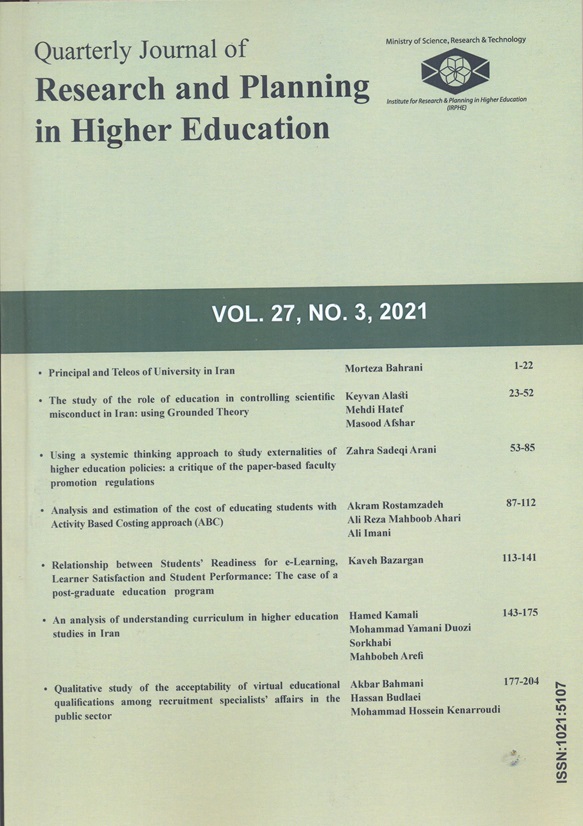The study of the role of education in controlling scientific misconduct in Iran: using Grounded Theory
Authors
1 philosophy of science, Department of theory-oriented STI studies, National Research Institute for Science Policy (NRISP), Tehran, Iran.
2 PhD Degree in Philosophy of Science, Department of Science Studies, Iranian Institute of Philosophy (IRIP), Tehran, Iran.
3 Master Degree in Philosophy of Science
Abstract
The study of the role of education in controlling scientific misconduct in Iran: using Grounded TheoryScientific misconduct in the most general sense is a deliberate violation of methodical and moral norms with the intention of deceiving others. Falsification, fabrication and plagiarism formally had been considered as the main examples of scientific misconduct by some researchers. In recent years, due to the reports presented, it has become necessary to examine the main misconduct cases and find its causes. It is assumed that at least one of the influential factors among academics should be rooted in the period of education, including higher education. Therefore, in this study, the following question was answered: What is the role of education, elementary education or higher education, in recognizing ethical norms, finding skills in reasoning and motivating researchers to perform ethical practice? to answer the question, the Grounded Theory method was used. In this study in-depth interviews with 15 faculty and students including researchers in ethics and education studies were done. Simultaneously, the obtained data were analyzed with primary, secondary, axial and selective coding and the final model was extracted. The final solution is to strengthen the implicit learning through the teacher-student face to face relationship in order to transfer the scientific-ethical behaviors, continuous rethinking of the criteria of scientific assessment, and continuous application of the criteria of assessment and the main and valuable subject of assessment and finally strengthening small "ethical environments" in a society that follows the norms of a scientific community including transparency and critique, freedom and differences of individuals.
Keywords
2. Abbasy, A., Dousti, M., & Zayer, B. (2015). Prevention methods and types of academic misconduct in communication management in sports media. Number 7, 2(3), 55-61 [in Persian].
3. Alasti, K., & Sheykh Rezaie, H. (2014). Scientific terms, conceptual change and semantic externalism. Methodology of Social Sciences and Humanities, 20(78) [in Persian].
4. Strauss, J.C. & Corbin (1998). Basics of Qualitative Research: Techniques and Procedures for Developing Grounded Theory. Sage Publications, Inc.
5. Ataie-Ashtiani, B. (2018). World map of scientific misconduct. Science and Engineering Ethics, 24(5), 1653-1656.
6. Charmaz, K. (1995). Grounded Theory. In R.H. Jonathan,& A. Smith (ed.). Rethinking Methods in Psychology (pp. 27-49). Sage Publication.
7. Charmaz, K. (2014). Constructing Grounded Theory. SAGE Publications Ltd.
8. Committee on Science, Engineering and Public Policy (2018). On Being a Scientist, a Guide to Responsible Conduct in Research. Tehran: NRISP.
9. D"Angelo, J. (2012). Ethics in Science, Ethical Misconduct in Scientific Research. CRC Taylor and Francis Group, LLC.
10. Darouian, S., & Faghihi, M. (2011). Survey of causes and motives of scientific plagiarism in Iran. Iranian Journal of Public Administration Mission, 2 (1), 137-154 [in Persian].
11. Farasatkhah, M. (2016). Qualitative Methodology in Social Science with emphasis on Grounded Theory Method. Aghah Publication [in Persian].
12. Fealy, S., Bighlari, N., & Pezeshki Rad, G. (2012). Agricultural students’ attitude and behavior on plagiarism in Tarbiat Modares University. Quarterly Journal of Research and Planning in Higher Education, 18 (3), 133-151 [in Persian].
13. Giroux, H.A. (1979). Social education in the classroom: The dynamics of the hidden curriculum. Theory and Research in Social Education, 7(1).
14. Hackett, E. (1994). A social control perspective on scientific misconduct. The Journal of Higher Education, 65 (3), 242-260.
15. Hacking, I. (1999). The Social Construction of What? Cambridge, Massachusetts and London: Harvard University Press, .
16. Hosseinpur, R., Bagheri, R., Afzali, R., & Shahri, M. (2018) An investigation of reasons for committing plagiarism in the iranian academic community. Foreign Languages and Linguistic Studies, 8(2), 555-588 [in Persian].
17. Jamshidi Borojeni, G., Saiidi, M., & Heidari, G. (2014). A survey on knowledge of post- graduate students of Shaheed Chamran University of Ahwaz of plagiarism and its influencing factors. Journal of Information Systems and Services, (3 & 4), 95-108 [in Persian].
18. Merton, R. (1938). Science and social order. Philosophy of Science, 5(3), 321-337.
19. Resnik, D. (1998). The Ethics of Science, an Introduction. Routledge.
20. Samadi, S., Abbasy, F., & Jalalzadeh, S. (2014). Ethical issues in scientific publications: Types and reasons of scientific misconduct in medical research. Ethics in Science and Technology, 9 (2) [in Persian].
21. Sharafi, L., & Alibaygi, A. (2014). Analysis of students cheating behavior: Application of multidimentional scaling. Quarterly Journal of Research and Planning in Higher Education, 141-160 [in Persian].
22. Ziaie, S., & Zamani Behabadi, N. (2016). Plagiarism of view of postgraduate students. Quarterly Journal of Knowledge and Information, 3(1), 83-96 [in Persian].
23. Zakersalehi, GH.R. (2010). Scientific Fraud: Social and Legal Aspects. institute of cultural and social studies of ministry of higher education.
24. Zuckerman, H. (1977). Deviant behavior and social control in science. Deviance and social Change, 1, 87-138.
 Quarterly Journal of Research and Planning in Higher Education
Quarterly Journal of Research and Planning in Higher Education
